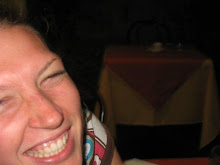I was brought up in the Catholic church, attending weekly Mass and religious education classes like any good Catholic. I never really enjoyed it (what 6-year-old likes getting up early, dressing nice, and sitting through an hour of something she doesn’t understand?) and remember fighting my parents a lot about going as a kid. I don’t think I every felt God in the Church, and definitely didn’t believe in God.
A big transition in my life began in the sixth grade, when I moved from elementary school to middle school. This meant new teachers, new classes, and new potential friends. See, the problem was, I didn’t really anticipate the new friends part of it, and entirely expected to keep the same group of friends I had had in fifth grade. So when those people started branching out and making new groups of friends, I ignored it and hoped it was just a phase and soon everything would be back to normal.
Well, that didn’t happen, and it wasn’t too long before I found my awkward 12-year-old self without a solid group of friends. I got depressed and angry, and my grades dropped, which caused my relationship with my parents to suffer. It became one of those vicious cycles I’d rather not relive. Anyway, when I finished sixth grade I saw no purpose in life, no point in living, and no reason to stay alive. I had no hope. But God was just putting me in a place where I absolutely needed Him, where I needed something bigger than myself, something greater than myself.
The summer after sixth grade I spent a week as Camp Carter, a place I had been to for a few years before and would continue attending a few years longer. I remember being surprised that week when counselors and other campers accepted me for who I was. It seemed that I had spent so long working to be a certain type of person, to behave a certain way, and just being loved for being me was an incredible thing to my 12-year-old mind.
It was probably a month or two later when I was visiting my grandmother in Massachusetts and she took me to see the play “Godspell.” In the version that we saw, teenagers—just a couple years old than me—played all of the parts except Jesus and Judas. The scene that hit me the most was when Jesus had been taken away and the disciples were all gathered together, mourning. Now I realize the teenagers were actors, of course, but when I looked into their eyes and saw such pain, such uncertainty, something changed for me. That these people, so close in age, could feel these things for a Man who had dies 2000 years earlier was unbelievable. In that moment, I wanted to feel that. I wanted to believe in something so deeply that it would be all I would ever need. I wanted to love someone so much that without them, my world crumbled.
This isn’t to say that I had an instant conversion in that little theatre on Cape Cod, but things started to change after that night. I began seventh grade with an entirely new attitude and a fresh outlook on life. I made friends, worked to turn my life around, and was happy for the first time in a long time. It wasn’t all sunshine and blue skies and key lime pie cheesecake after that, but during that summer, God filled me with hope and turned my eyes toward Him.
A lot of things have changed since those first steps of faith. I have seen God in so many different ways and my faith has been transformed by hundereds of people and events. But that is my foundation, that is where I come from. And I continue to walk forward from that day with something I had never really known before: unconditional love.
Today I turn around
Stop running away from Him.
Today I listen
And run toward.














